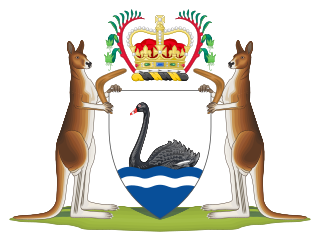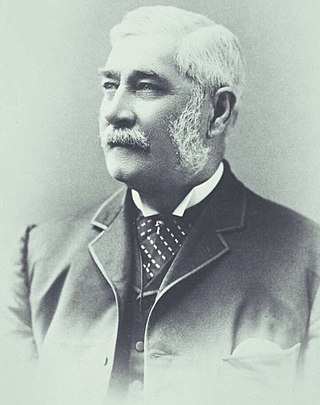Related Research Articles

The premier of Western Australia is the head of government of the state of Western Australia. The role of premier at a state level is similar to the role of the prime minister of Australia at a federal level. The premier leads the executive branch of the Government of Western Australia and is accountable to the Parliament of Western Australia. The premier is appointed by the governor of Western Australia. By convention, the governor appoints as premier whoever has the support of the majority of the Western Australian Legislative Assembly, the lower house of the Parliament of Western Australia. In practice, this means that the premier is the leader of the political party or group of parties with a majority of seats in the Legislative Assembly. Since Western Australia achieved self-governance in 1890, there have been 31 premiers. Roger Cook is the current premier, having been appointed to the position on 8 June 2023.

Sir Frederick Palgrave Barlee was Colonial Secretary of Western Australia from 1855 to 1875; Lieutenant-Governor of the British Honduras from 1877 to 1882; and Administrator of Trinidad in 1884.

The Commonwealth Court of Conciliation and Arbitration was an Australian court that operated from 1904 to 1956 with jurisdiction to hear and arbitrate interstate industrial disputes, and to make awards. It also had the judicial functions of interpreting and enforcing awards and hearing other criminal and civil cases relating to industrial relations law.

Sir James George Lee Steere was a Western Australian politician and a prominent member of the six hungry families.
The Colonial Secretary of Van Diemen's Land was the representative of the British Colonial Office in Van Diemen's Land, and was usually appointed from Britain. In 1884, the role was renamed Chief Secretary.
Lieutenant general is the second-highest active rank of the Australian Army. It was created as a direct equivalent of the British military rank of lieutenant general, and is considered a three-star rank.

The Treasurer of Western Australia is the title held by the Cabinet Minister who is responsible for the management of Western Australia's public sector finances, and for preparing and delivering the annual State Budget. With only rare exceptions, until 2001, the position of Treasurer was usually held by the Premier of Western Australia.

The Hon Septimus Burt KC was a Western Australian lawyer, politician and grazier, the son of Sir Archibald Burt.
Charles Edward Bright was an English businessman in colonial Victoria.
Michael O'Connor was the first Catholic Bishop of Ballarat, located in Victoria, Australia.

Sir Henry Cuthbert, was a politician in Victoria (Australia), member of the Victorian Legislative Council.

Alexander Lang Elder was a Scottish Australian businessman and politician in colonial South Australia.

Edward William Lamb was an Australian businessman, banker and politician. In 1867 he was elected to the Legislative Assembly of Queensland for Mitchell and was Queensland's Secretary for Public Lands from 1867 to 1868. A member of the Lamb banking family, he became a director of the Commercial Banking Company of Sydney.
George David Langridge was a politician in colonial Victoria (Australia), acting Premier of Victoria in 1891.

Thomas de Lacy Moffatt, was a politician in colonial Queensland, and a Treasurer of Queensland. His surname is also sometimes spelled "Moffat".
Philip Dearman Mennell, was an English-born encyclopaedist, journalist and newspaper owner, active in Australia, author of the Dictionary of Australasian Biography (1892).

HMS Mermaid was a cutter built in Howrah, India, in 1816. The British Royal Navy purchased her at Port Jackson in 1817. The Navy then used her to survey the Australian coasts. In 1820 she grounded and in 1823 was condemned for survey work. The Navy sold her to the colonial government which used her to run errands until she was wrecked in 1829.
William Harvie Christie was an Australian politician.

Pilgrim Uniting Church is a Uniting church located on Flinders Street, Adelaide in South Australia.
References
- ↑ "WA Police Commissioners". Western Australia Police Force. Retrieved 19 May 2018.
- ↑ "Commissioners - Western Australia". Australian Federal Police. Retrieved 19 May 2018.
- ↑ Honniball, J.H.M. (1969). "Barlee, Sir Frederick Palgrave (1827–1884)". Australian Dictionary of Biography . Vol. 3. Canberra: National Centre of Biography, Australian National University. ISBN 978-0-522-84459-7. ISSN 1833-7538. OCLC 70677943 . Retrieved 20 May 2018.
- ↑ Mennell, Philip (1892). "Barlee, Sir Frederick Palgrave". The Dictionary of Australasian Biography. London: Hutchinson & Co – via Wikisource.
- 1 2 3 4 Rica Erickson (1987). The Bicentennial Dictionary of Western Australians: pre-1829 –1888. Vol. 1 A–C. University of Western Australia Press. ISBN 0 85564 270 X . Retrieved 26 April 2024.
- 1 2 3 4 Rica Erickson (1988). The Bicentennial Dictionary of Western Australians: pre-1829 –1888. Vol. 2 D–J. University of Western Australia Press. ISBN 0 85564 273 4 . Retrieved 26 April 2024.
- 1 2 3 4 Rica Erickson (1988). The Bicentennial Dictionary of Western Australians: pre-1829 –1888. Vol. 4 R–Z. University of Western Australia Press. ISBN 0 85564 277 7 . Retrieved 26 April 2024.
- ↑ Kimberley, Warren Bert (1897). "Chapter 17". History of West Australia – via Wikisource.
- ↑ Erickson, Rica (1976). "Timperley, William Henry (1833–1909)". Australian Dictionary of Biography . Vol. 6. Canberra: National Centre of Biography, Australian National University. ISBN 978-0-522-84459-7. ISSN 1833-7538. OCLC 70677943 . Retrieved 20 May 2018.
- ↑ Conole, Peter (2005). "Smith, Matthew Skinner (1836–1887)". Australian Dictionary of Biography . Vol. Supplementary Volume. Canberra: National Centre of Biography, Australian National University. ISBN 978-0-522-84459-7. ISSN 1833-7538. OCLC 70677943 . Retrieved 20 May 2018.
- ↑ Mennell, Philip (1892). "Smith, Captain M. S.". The Dictionary of Australasian Biography. London: Hutchinson & Co – via Wikisource.
- ↑ Mennell, Philip (1892). "Phillips, Major George B.". The Dictionary of Australasian Biography. London: Hutchinson & Co – via Wikisource.
- ↑ Kimberley, Warren Bert (1897). "George Braithwaite Phillips". History of West Australia – via Wikisource.
- 1 2 Rica Erickson (1988). The Bicentennial Dictionary of Western Australians: pre-1829 –1888. Vol. 3 K–Q. University of Western Australia Press. ISBN 0 85564 276 9 . Retrieved 26 April 2024.
- ↑ McArthur, T.J. (1993). "Connell, Robert (1867–1956)". Australian Dictionary of Biography . Vol. 13. Canberra: National Centre of Biography, Australian National University. ISBN 978-0-522-84459-7. ISSN 1833-7538. OCLC 70677943 . Retrieved 20 May 2018.
- ↑ "William Archibald Douglas". Northern Times. Carnarvon, Western Australia. 26 November 1934. p. 3. Retrieved 20 May 2018.
- ↑ "Police Commissioner : Inspector D. Hunter Chosen". The West Australian. Perth, Western Australia. 6 December 1934. p. 18. Retrieved 20 May 2018.
- ↑ "New W.A. Police Chief Known Here". The News. Adelaide, South Australia. 20 January 1945. p. 3. Retrieved 20 May 2018.
- ↑ "Mr. T.H. Andersen chosen as Police Commissioner". The West Australian. Perth, Western Australia. 28 February 1951. p. 1. Retrieved 19 May 2018.
- ↑ Police, Western Australia. "Our History". Western Australia Police. Retrieved 3 January 2019.
- ↑ Thompson, Holly (14 June 2022). "'A cop through and through': Meet the new WA Police Commissioner". WAtoday. Retrieved 15 July 2022.
- ↑ Bourke, Keane (14 June 2022). "WA Police deputy Col Blanch named new commissioner, replacing Chris Dawson". ABC News. Retrieved 15 July 2022.
- ↑ "New Commissioner of Police announced". Western Australia Police Force. 14 June 2022. Retrieved 15 July 2022.